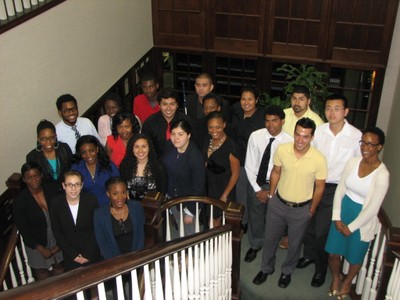Undergraduates getting a taste of law school at Rutgers-Camden
CAMDEN — As the legal profession continues to diversify, a group of 20 undergraduate students from various backgrounds is experiencing a slice of law school life at Rutgers–Camden.
Now through June 29, the LSAC Discoverlaw.org Prelaw Undergraduate Scholars Program at the Rutgers School of Law–Camden is working to increase diversity in the legal profession by improving the qualifications of potential law school applicants who are members of racial and ethnic groups that are underrepresented in the profession.
Funded by a $100,000 grant from the Law School Admission Council, the month-long program puts the scholars through a challenging schedule of courses that covers many law topics.
“There is value in diversifying the legal profession in terms of such measures as socioeconomic status, race, and sexual identity,” says Jill Friedman, director of pro bono and public interest programs at the Rutgers School of Law–Camden and co-director of the Discover Law program. “We want to identify students from these backgrounds who have the interest and the potential and give them the tools they need to succeed.”
The council is committed to the idea that the legal profession should reflect the ever-increasing diversity of our society. The scholars are undergraduate students from all over the country who represent African, African-American, Asian, and Hispanic communities, among others. Many of them are the first in their families to attend college.

“For there to be true access to justice in this country, more diversity must be represented in the legal profession,” Friedman says.
The students were chosen from a pool of 90 applicants who have expressed an interest in law and have completed one or two years of undergraduate study.
They are being introduced to the various aspects of law through a rigorous academic program with emphasis on legal writing. Rutgers–Camden law faculty instruct sessions and cover topics like bioethics, civil rights, legal analysis, mediation, oral advocacy, persuasion, property law, and torts.
“We want the students to realize what law school is really like, so the core of the program is a rigorous academic program where they’re writing case briefs for class, memoranda, and briefs for judges, just as a law student would do,” says Angela Baker, associate dean of students and career planning at the Rutgers School of Law–Camden and co-director of the program.
The program also involves field trips to courthouses and law firms and meetings with lawyers, which Friedman says helps the students envision themselves in the roles or judges and attorneys.
“It gives them a chance to see people from different backgrounds in the profession,” Friedman says. “They get to meet people who have faced challenges similar to their own.”
Vanessa Espinal, a junior at the New Jersey Institute of Technology double majoring in history and technology, says the program has convinced her to pursue law school after graduation.
“It’s taught me how to think about things from many different viewpoints and to think analytically,” says Espinal, who is from Paterson.
Tracey Cordeiro, a junior jurisprudence major from Montclair State University, says the program reinforced her desire to work in the legal profession.
“It’s been a good experience,” says Cordeiro, a North Arlington resident. “I’ve learned a lot of detailed lessons about different aspects of law and I’m approaching problems in a critical manner and using logic to solve those problems.”
Jeremy Capati is a sophomore political science major who is transferring to Ramapo College in the fall. A resident of Kenilworth, Capati is blind and said the idea of advocating for people with disabilities appealed to him.
“This program is opening my mind to different paths of law,” Capati says. “It’s certainly given me even more questions, but in a good way. I’m more curious. The knowledge being shared here is valuable.”
Also among the group are students from universities like Brown, Cornell, La Salle, Penn State, the University of Pennsylvania, and the University of Washington.
Conrad Haber, who graduated from the Rutgers School of Law–Camden in 2011, is mentoring the students along with four current Rutgers–Camden law teaching assistants throughout the program.
“They’re very passionate about it and they’re very curious,” says Haber, the program’s assistant director. “They’re enthusiastic about it and it’s great to see.”
The program curriculum is designed to enhance critical thinking, critical reading, problem solving, writing, and persuasive and public speaking skills. Students are using a fictional case about a high school student who is suspended from school for drug possession to explore different aspects of law.
At the close of the program, on June 29, the scholars will argue the fictional case in the Rutgers–Camden moot courtroom in front of real judges and attorneys.
“We don’t want to sugarcoat it and make it seem like it’s easy to go through law school,” says Baker. “We want to give them a realistic experience.”
Rutgers–Camden is one of nine universities that have been awarded funding for the Discover Law program. The grant, which also covers on-campus housing and meals for the students, is renewable for three years at $100,000 per year.
For more information on the Discover Law program at Rutgers–Camden, visit camlaw.rutgers.edu/plusprogram.
More information can also be found at discoverlaw.org.
Media Contact: Ed Moorhouse
(856) 225-6759
E-mail: ejmoor@camden.rutgers.edu